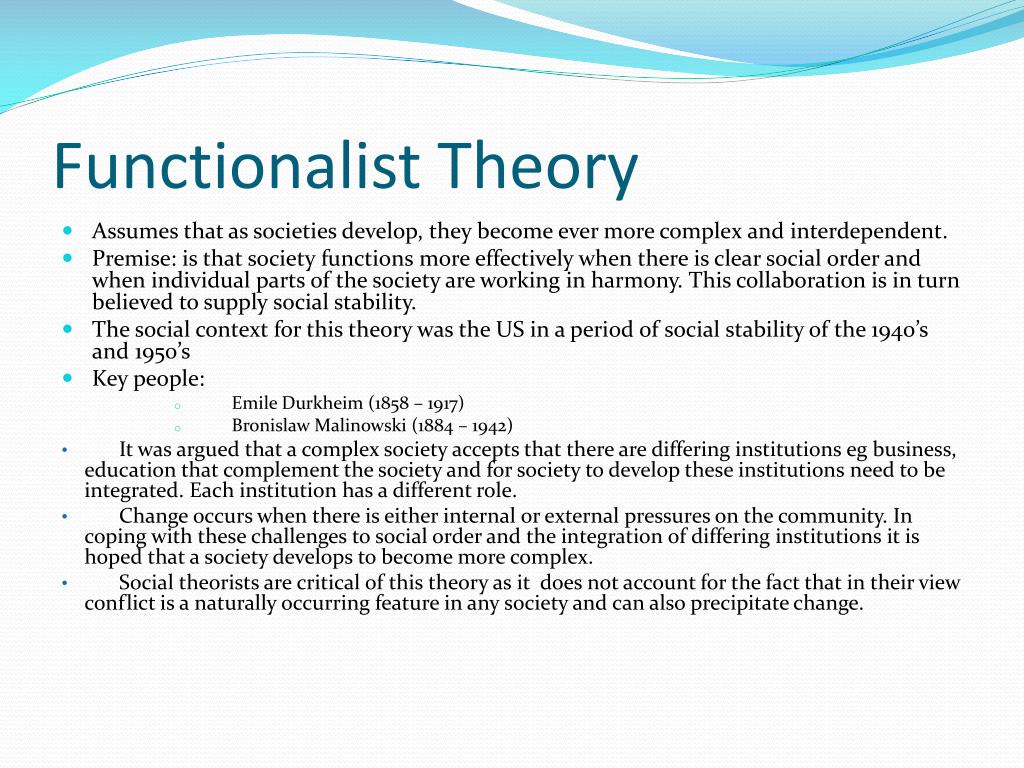Imagine a bustling city, a complex organism humming with activity. Millions of individuals, each with their own dreams, goals, and challenges, interact in a seemingly chaotic yet organized manner. How does this intricate system function? How do different parts of the city, like its businesses, government, and residents, contribute to its overall stability and progress? The answer lies in a sociological perspective known as functionalism.

Image: www.slideserve.com
Functionalist theory, a cornerstone of sociology, views society as a complex, interconnected system where each part plays a vital role in maintaining its overall equilibrium. Think of it as a well-oiled machine, with each cog collaborating to make the whole engine work smoothly. From the family unit to the education system, every social institution contributes to the functioning of society as a whole. By understanding these interconnections, we gain valuable insights into how societies operate and evolve.
Examples of Functionalist Theory in Action
Let’s delve deeper into how functionalism plays out in our daily lives. Here are some compelling examples:
- The Family Unit: Functionalism sees the family as the foundation of society, responsible for primary socialization, emotional support, and the transmission of cultural values. Parents, children, and siblings each play distinct roles in maintaining the family’s stability and well-being.
- Education System: From kindergarten to college, educational institutions play a critical role in transmitting knowledge, skills, and values, preparing individuals for their roles in society. Think of school as a training ground for future citizens, instilling a sense of social responsibility and preparing individuals for the workforce.
- Government & Law Enforcement: The government, through its laws and regulations, provides a framework for social order and stability. Law enforcement agencies, such as police departments, act as guardians of this order, protecting citizens and upholding the rule of law.
- Religious Institutions: Religion provides a moral compass and ethical framework for many societies. Through rituals, ceremonies, and teachings, religious institutions shape individual behavior and reinforce cultural values, promoting a sense of community and belonging.
- Economic System: In any society, the economy provides the means of production, distribution, and consumption of goods and services. This intricate system, involving businesses, workers, consumers, and financial institutions, keeps society’s needs met.
The Importance of Maintaining Social Order
Functionalism emphasizes the importance of social order and stability. It suggests that societies strive to maintain equilibrium by ensuring that social institutions function effectively and meet the needs of their members. This stability is crucial for the smooth functioning of society and the well-being of its individuals.
Functionalism: A Lens for Understanding Social Change
While functionalism highlights the importance of social order, it also acknowledges that change is inevitable. Societies are dynamic entities, constantly adapting to new challenges and opportunities. When change occurs, functionalism suggests, it disrupts the existing equilibrium, forcing institutions to adapt and evolve to restore balance.

Image: www.youtube.com
Criticisms of Functionalist Theory
It’s important to acknowledge that functionalism, like any sociological perspective, isn’t without its criticisms. Some argue that it oversimplifies social realities, focusing too heavily on stability and neglecting the complexities of power dynamics and social inequalities. Critics also point out that functionalism can be used to justify existing social structures, even those that are unfair or discriminatory.
Moving Forward: Applying Functionalist Insights
Despite its criticisms, functionalism offers a valuable framework for understanding the interconnected nature of social life. By recognizing how different social institutions contribute to the functioning of society, we gain a deeper appreciation for the complexities of human interaction and the intricate dance of social order.
Examples Of Functionalist Theory
The Takeaway: A Deeper Understanding of Society
Functionalist theory, though not without its limitations, provides a valuable lens for analyzing the intricate workings of society. By understanding its key concepts and real-world applications, we gain a deeper understanding of the complex interplay between social institutions and individuals, helping us navigate the challenges and complexities of the human experience.






